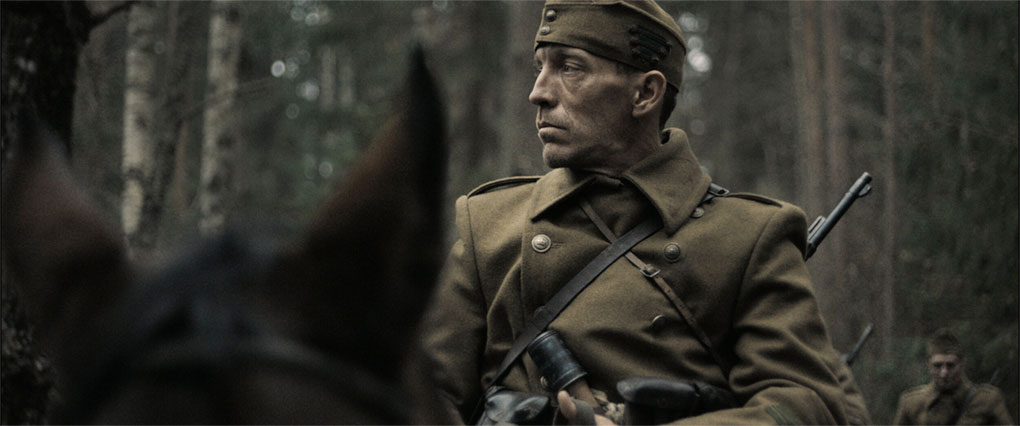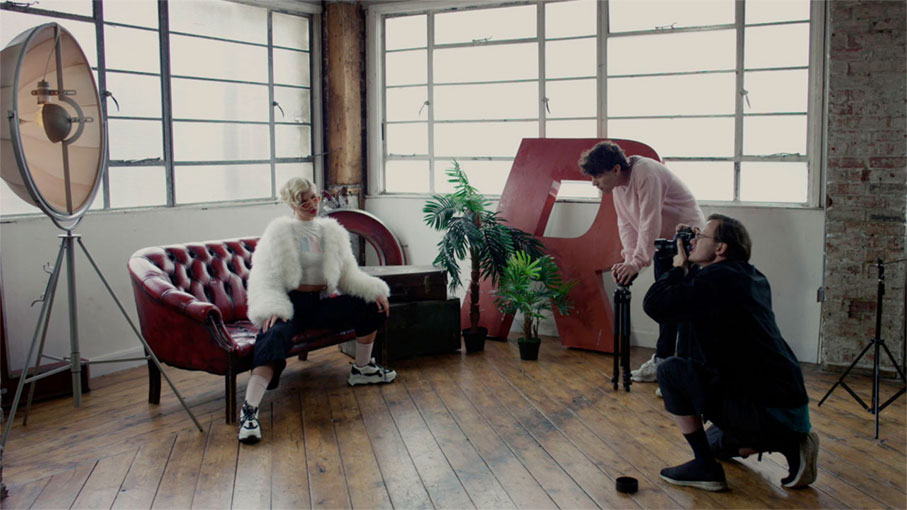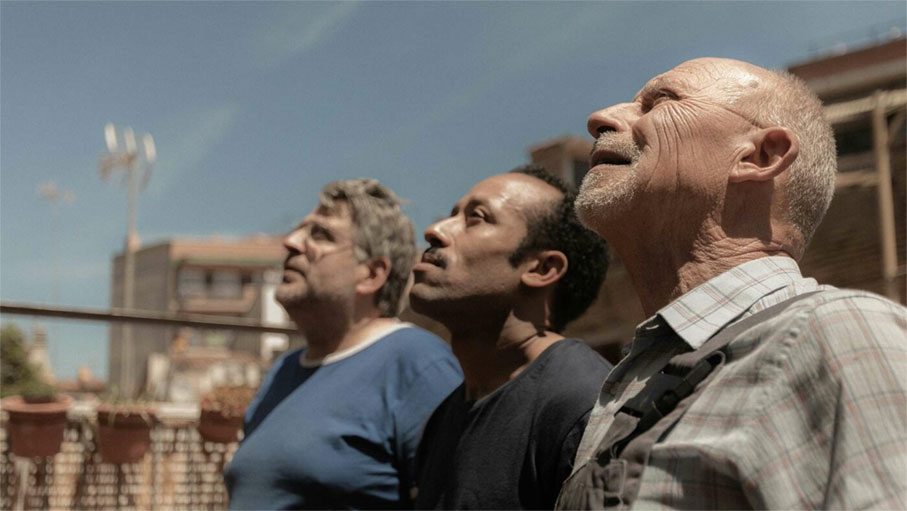|
This will be the last of the daily updates for a couple of days due to the pressures of my day job and the time needed to format other reviews and news stories, so the next posting will include reviews from two or three days in one dispatch. Today we have three, but one of them really is a capsule review, primarily because I can’t talk about the bits that are most worthy of discussion without delivering a monumental spoiler.
| NATURAL LIGHT [TERMÉSZETES FÉNY] |
|
During World War 2, thousands of Axis-aligned Hungarian soldiers patrolled the woodlands and villages of the occupied Soviet Union, imposing order and seeking out and supressing partisan activity. One of these soldiers, Corporal István Semetka (Ferenc Szabó), is a member of a small platoon that happens upon a small village deep in the winter woodland, which the soldiers take over for three days in order to plan their next move.
The debut feature from Hungarian director Dénes Nagy is less interested in telling a complex story than in examining the relationship between an occupying force and those whose homes they effectively invade. It’s shown initially to be neither an amicable nor openly hostile one, a pragmatic approach on the part of unarmed civilians who are only too aware of the violence that active resistance would likely unleash. Thus, the soldiers move in, merrily eat and make comments about what they’d like to do to the women who silently and obediently bring them water, and force one unfortunate male villager to crawl under the table like a pig, then take him outside to be photographed by the reluctant István with the company sergeant pulling at the poor man ear.

István’s consistently stone-faced lack of emotion makes it hard to accurately pinpoint how he feels about the war and his role in it, but there’s a sadness in his eyes that infuses his glances to one of the younger village women with a sense of longing, one that seems to be tied more to his eight-month absence from home than any feelings he has for the girl. Later, when caught in a firefight, he remains level-headed, ordering his men to make a quiet retreat while edging forward to drag a fallen comrade to safety, unaware that the man has already expired. Increasingly there’s a sense that István is just a man doing his job, one who copes with the horrors he has seen and possibly participated in by shutting down his emotions, a safety barrier against a breakdown you can’t help but suspect he’s just delaying rather than preventing. He becomes complicit in the actions of his comrades because he doesn’t have – or perhaps no longer has – what it takes to effectively protest.
Critical opinion appears to be a little divided on Natural Light, with the naysayers claiming that it brings nothing new to the table and that its hard to engage with a protagonist who is an emotional blank slate, while the film’s supporters enthuse about its oppressive atmosphere, its air of realism and the meditative minimalism of its handling. In a sense, both are right, and which camp you end up siding with more will depend in part on your cinematic tastes. In terms of statements about war, I’m also not sure it has anything new to say, and there are times when it invokes Elim Klimov’s magisterial masterpiece, Come and See, which has the unfortunate effect of making it easy for those familiar with that film to predict the arrival of Natural Light’s most shocking scene long before it occurs. But Tamás Dobos’ gorgeously gloomy handheld cinematography and naturalistic lighting (what was the film’s title again?), coupled with some first-rate production and costume design and some savvily cast supporting players, create a potent sense of place, of a cold and inhospitable landscape and of wartime soldiering as a miserable, thankless and sometimes most unpleasant business.
Natural Light is screening at the following times, dates and venues:
- Tuesday 12 October 2021, 18:10 at Curzon Mayfair, Screen 1
- Wednesday 13 October 2021, 18:30 on BFI Player, available for 24 hours only
- Wednesday 13 October 2021, 20:40 at Curzon Soho Cinema, Screen 3
- Friday 15 October 2021, 18:10 at BFI Southbank, Studio
An eccentric photographer (Sid Phoenix), his young intern Luke (James Aroussi), attractive model Eve (Isabelle Bonfrer) and jaded makeup artist Alexandra (Rosie Steel) gather in a London warehouse for a fashion photoshoot. It’s a story setup that takes quite a while to play out and has characters who barely know each other sitting around conversing or staring idly into space. Yet it’s curiously never boring, in part because it absolutely nails what it’s like to be part of small film or photoshoot crew and sit around making small talk with people you’d probably not mix with socially while you wait for the arrival of an actor, a model, or a favourable change of weather. Yet once Eve arrives and the shoot gets under way, the tone doesn’t significantly alter. Luke then makes a troubling (if unlikely) discovery, after which one of the group disappears without taking their belongings. We’re halfway through the film by this point, and in terms of plot, not a lot has really happened. What could it possibly be building to? If you go in unprepared, the chances are you’ll never guess.

And here’s the problem when it comes to writing about the film. No-one planning to watch it should be aware in advance where it goes next, and I thus have no intention of discussing it, despite the fact that there’s more to talk about in the second half than there is in the oddly engaging first. What I will say is that it plays with an interesting concept, but one that was explored in considerably more detail and complexity in an American low budget indie movie a few years ago, one that I also have no intention of naming here. By the standards of that film, All is Vanity feels a little like an interesting sketch for an as-yet unrealised and more fully fleshed-out work, one that in retrospect has the feel of a smart microbudget short film that has been stretched out here to fill a 72-minute feature.
It does make good use of its single location and is well shot by cinematographer Murat Ersahin, while first time feature director Marcos Mereles – who at one point is name-checked in the script – plays some interesting if occasionally self-conscious games with story structure and film form. As the photographer whose name I never caught, Sid Phoenix has the look and some of the acting tics of a young Chris Morris, which itself is rather entertaining to watch, but once the thing that I can’t talk about occurs, the film never quite clicked for me. Perhaps the ghost of that unmentioned American indie – of which I am a huge fan – was just a little too strong, but if you get the chance to see it I’d still definitely recommend giving it a look. Just try to avoid any reviews that give away the most unexpected turn it later takes.
All is Vanity is screening at the following times, dates and venues:
- Monday 11 October 2021,t 21:00 at Curzon Soho Cinema, Screen 1
- Wednesday 13 October 2021, 15:15 at BFI Southbank, NFT3
| THE ODD-JOB MEN [SIS DIES CORRENTS] |
|
On the outskirts of Barcelona, Moroccan migrant Moha (Mohamed Mellali) applies for a job at a small plumbing and electrical contracting firm and is given a week’s trial. His is put to work with the ageing Pep (Pep Sarrà), who is planning to retire later in the week, and the grouchy Valero (Valero Escolar), who dislikes the very idea of taking on a new worker and is antagonistic towards Moha from the start.
This is the setup for a low-key and naturalistic situational comedy that is all about the relationship between the three plumbers and their interactions with their colourful range of clients. The tone is set by the trio’s first job together, with their elderly client grumpily telling Valero to mind his own business when he asks about his age, then pulling Moha away from his work to enthusiastically outline the diet and exercise routine that he claims has enabled him to reach 100 years of age. It’s here that director Neus Ballús’s gentle approach to comedy is defined, as the sight of the irritated Valero complaining about how long it’s taking the new ‘hotshot’ worker to fix a tap then cuts to the ever-patient Moha being shown yet another aspect of the old man’s daily workout. Once the job is complete, the gag is extended into the following scene, when it’s revealed that the old man has also written the details of his diet out for Moha to try, a note that Valero snatches irritably from his hand when he starts to read its contents out loud to his companions.
It’s hard to be sure whether Valero’s dislike of Moha is because he’s uncomfortable with change, or he sees this younger and fitter man electrician as a threat, or his prejudice has a basis in bigotry. His constant badgering of Moha certainly made me want to slap him at times, and his attitude is not helped by their experience on subsequent jobs. On one, Moha is blamed for not shutting of a mains circuit that unbeknown to either men was being switched on again by the client’s mischievous children, and while Valero is repairing the air conditioning unit at a photographic studio, the photographer is busy persuading the good-looking Moha to whip off his shirt and pose for a photo shoot.

Moha is always sympathetically presented, and it’s he who provides the occasional narration that drops interesting titbits about various aspects of the life and work ethic of those in his profession. He’s shown eagerly participating in evening classes to improve his Catalan, suffers silently when Valero moans to the boss about him, and struggles to study in peace in an apartment he shares with his bone-idle and constantly mocking cousins (Hamid Minoucha and Youssef Ouhadi). When distracted from his work by the old man or the pushy photographer, it’s never because he’s workshy (he always protests that he has to get back to the job at hand) but because he’s too polite to just say no and walk away.
Although there are a couple of laugh-out-loud moments, The Odd-Job Men seems designed primarily to provoke amused smiles, and on that score it frequently hits its target. Deep down, we all know that Valero will eventually accept this newcomer and bond with him in some way, but the journey there is peppered with entertaining encounters (whilst fitting a security system for a wealthy psychiatrist, their bickering prompts the doctor to treat them as patients) and some rather nice dovetailing of scenes into others. After walking in on Moha’s photoshoot, for example, the overweight Valero later starts to contemplate his own body image, and the next day is shown to have retrieved the note he snatched earlier from Moha and is using the old man’s recommendations as the basis for a healthier diet. And just when you think the retiring Pep has dropped out of the story, he strolls back in to complain bitterly about the shoddy workmanship of builders and lets rip with such (off-screen) anger that he ends being treated in hospital for an injury to his hand.
The Odd-Job Men is an immensely likeable work whose easy-going character comedy is nicely underscored with a layer of social commentary built around the attempts to integrate by the affable Moha and the barriers that are sometimes throw up in his way. So authentic are the three leads when working on jobs that I became convinced that they been persuaded by director Ballús to do some training in this field, only to discover that Mellali, Escolar and Sarrà are not actors at all but real-world plumbers who were recruited to play alternate versions of themselves in the film. It’s a gamble that really pays off here, and adds to the sense that if these three came to your house to fix a leaky water tank, they’d not be that different to the characters they play on screen.
The Odd-Job Men is screening at the following times, dates and venues:
- Monday 11 October 2021, 18:15 at ICA, Screen 1
- Wednesday 13 October 2021, 12:45 BFI Southbank, NFT3
|